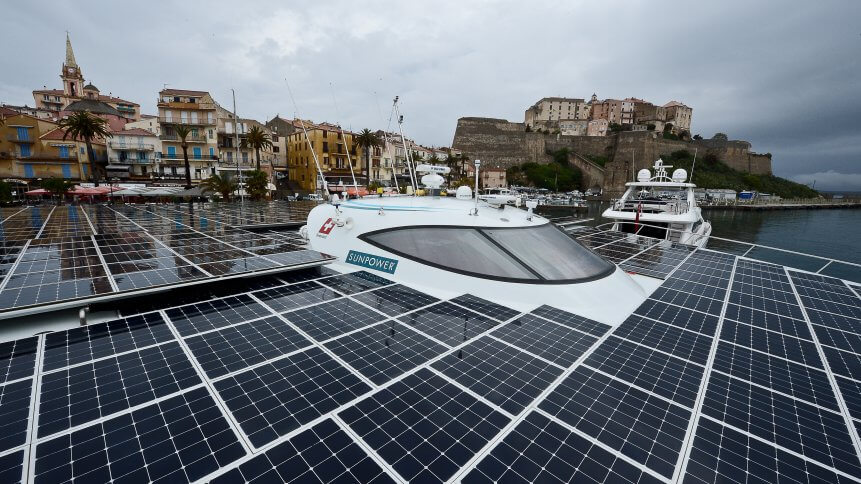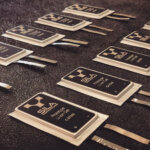
Planetsolar is the biggest solar ship in the world with its 537 m2 of photovoltaic panel power 6 blocks of lithium-ion battery, thus enabling a navigation time that is unmatched to date. (Photo by Andreas SOLARO / AFP)
Much like the global semiconductor crisis that was holding back multiple industries after the onset of the pandemic, now lithium is experiencing a global shortfall as electric carmakers in Europe and elsewhere race to produce the lithium-ion batteries that these greener vehicles run on. This follows ongoing requirements from European organizations that have committed to sustainability targets as part of a larger effort to be more mindful of their environmental impact.
Europe is seeking to expand its lithium mining and refining capacity and wean itself off imports as the so-called “white gold” metal becomes a vital resource in the fight against climate change. Alongside nickel and cobalt, lithium allows electricity to be stored and transported, making them essential in electric battery production as car manufacturers move away from polluting fossil fuels.
But Europe mostly depends on external sources for the strategically important and increasingly coveted metals. Australia is the world’s biggest lithium producer, while China is home to 60% of global lithium refining, transforming the metal into carbonate or lithium hydroxide.
The increasingly urgent subject was on the agenda of EU ministers and officials at a conference in Paris a few weeks ago. It will also be the menu when EU industry ministers gather in the northern French city of Lens at the end of January and the beginning of February.
Europe “really is not on the map” when it comes to mining or processing lithium, according to Robert Colbourn, an analyst at Benchmark Mineral Intelligence. “There are a lot of lithium mines in development today in Europe, or projects trying to come online, but really there is no lithium production” of battery quality, he told AFP.
The International Energy Agency predicts global demand for lithium will be 40x greater by 2040, with 475,000 tonnes of lithium produced in 2021. But Europe will not even meet more than 30% of its lithium, nickel and cobalt needs in 2030, according to a report submitted to the French government this week.
“Our forecast is that by 2030 Europe is probably going to need over 500,000 tons of lithium a year, which is bigger than the world market today,” said Colbourn, adding that battery production was driving the soaring demand.
The European Union has only just added lithium to its list of critical metals. With plans for at least 38 new electric battery plants in Europe, the question of supplying them with the necessary metals is far from being resolved.
“We need very strong measures. The idea for the 27 is not to go from depending on oil to depending on metals,” said a source at France’s economy ministry to AFP. “We depend far too much on external powers, especially China.”
Not lacking for supply
Europe does not lack the coveted raw materials, with deposits in France, Germany, Portugal, the Czech Republic, and Serbia. The French government has set aside a budget worth one billion euros and launched tenders to extract or refine lithium, cobalt, nickel, and iridium.
French mining company Eramet has also extracted lithium from geothermal brine in Alsace, eastern France, a technological breakthrough that could open up further exploration in the River Rhine basin. Meanwhile an Australian mining group says it produces carbon-neutral lithium in Germany under the Vulcan brand, which has attracted car giants Renault and Stellantis.
Germany will also host a refinery in 2024 built by Canadian group Rock Tech Lithium. In Portugal, a lithium refinery led by Portuguese oil company Galp Energia and Swedish battery manufacturer Northvolt has just been announced.
But NGOs and scientists have warned of the environmental impact of increased mining activity. Anglo-Australian mining giant Rio Tinto, which has financed mining exploration studies in Serbia since 2004, faced protests in the Balkan nation in December as demonstrators demanded reports on the project’s environmental impact be published.
Serbian authorities have since then abandoned plans to build a controversial lithium mine, the prime minister admitted last week, following weeks of protests against the project set to be built by Rio Tinto. Vast deposits of lithium — a key component for electric car batteries — are found around the western town of Loznica, where the Anglo-Australian company had bought up land and was awaiting a final green light from the state to begin mining.
In Portugal, the environmental regulator is also due to rule on a lithium mining project in the north of the country. France’s ecological transition minister Barbara Pompili has said the country should “rule out nothing” regarding extraction if it is environmentally sound.
Lithium triangle
Europe could also increase its South American lithium sources. Argentina, Bolivia, and Chile form a “lithium triangle” that is the world’s second-largest producer of the valuable metal.
Eramet said it would open a plant in Argentina in 2024 with Chinese firm Tsingshan, with Eramet chief executive Christel Bories saying it would meet 15% of Europe’s lithium needs.
Chile, which was the world’s top lithium producer until 2016, at first granted an exploration and production concession to a Chinese and a Chilean firm. Each company was to be allocated 80,000 tons of lithium as Chile hopes to regain its leading place on the global stage. That was before a Chilean appeals court last week suspended a million-dollar state lithium tender issued two days prior, that had generated controversy for coming just two months before the end of conservative President Sebastian Pinera’s term.
While also being hailed as a green difference-maker in traditionally fossil fuel sectors like automotive manufacturing, lithium extraction has also attracted the wrong kind of attention — ironically, for a similar ‘environmental impact’ sort of complaint that dogged its predecessors.
with additional reporting by © Agence France-Presse
20 June 2024










